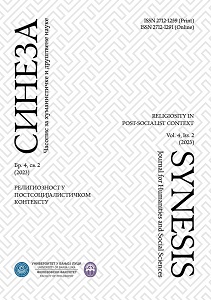Društvenopolitičke implikacije etnokonfesionalizma – primjer Bosne i Hercegovine
Socio-political implications of ethnoconfessionalism - the example of Bosnia and Herzegovina
Author(s): Duško TrninićSubject(s): Social history, Crowd Psychology: Mass phenomena and political interactions, Transformation Period (1990 - 2010), Sociology of Religion
Published by: Filozofski fakultet, Univerzitet u Banjoj Luci
Keywords: religion; religiousness; revival of religion; confessionalism; Bosnia and Herzegovina;
Summary/Abstract: Contemporary religious trends usually speak about individualisation and privatisation of religious feelings, most often expressed through a maxim of believing without belonging (Davie, 1990), whereas in Bosnia and Herzegovina the situation is different. In the last decade of the last century and the beginning of the twenty first century, we witness restoring to life and revival of religion, as well as a rise of collectivist religion and religiousness. High rate of religious and confessional self-identification, which we witnessed during censuses in 1991 and 2013, was not motivated only by religious, but primarily by social, historic, political, and cultural reasons, which followed the flow itself of social movements and changes. Religious belonging, which earlier, during the socialist socio-political system, was (held) deep down in private sphere of people’s lives, now becomes socially desired, whereas religious identification, (becomes) an essential identification determinant. Hence, it seems important to pose following questions – What kind of religion are we dealing with here? Is the high rate of religious and confessional self-identification in our society determined by proper spiritual/religious needs or simply by the desire to, through the religious belonging, preserve ethnic/national uniqueness and establish differentiations towards others? The answers to these questions are significant for at least two reasons: in theory, because they correspond with the shift in contemporary sociology of religion, which is directed towards the answer to the question of how, as opposed to the previous one – why we believe; whereas, on the other hand, perhaps even more importantly, if we properly view the relationships in Bosnia and Herzegovina we have socio-political reasons, where the given solutions can significantly assist in resolving the relationship between a church and state, i.e. a clear position of religion in public life and its role in modern socio-political movements and changes.
Journal: Sineza
- Issue Year: 4/2023
- Issue No: 2
- Page Range: 23-41
- Page Count: 19
- Language: Serbian

